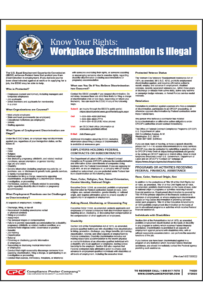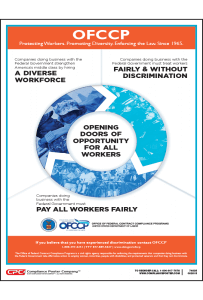 On March 4, 2019, a federal court overturned an agency-ordered delay of EEO-1 pay data rules. The rules will require employers with 100 or more employees to submit wage and hour information for employees in addition to data already required by the EEO-1 survey. The EEO-1 survey in its current form collects employment data from private employers for a representative pay period of the previous year, categorized by race/ethnicity, gender, and job category.
On March 4, 2019, a federal court overturned an agency-ordered delay of EEO-1 pay data rules. The rules will require employers with 100 or more employees to submit wage and hour information for employees in addition to data already required by the EEO-1 survey. The EEO-1 survey in its current form collects employment data from private employers for a representative pay period of the previous year, categorized by race/ethnicity, gender, and job category.
The Equal Employment Opportunity Commission (EEOC) and the Office of Federal Contract Compliance Programs (OFCCP) use this data as a source of information about representation of women and racial minorities in the workforce, including their distribution within specific companies, industries, and geographic regions. This information allows the agencies to identify patterns of potentially discriminatory practices and set civil rights enforcement priorities.
EEO-1 survey compliance is required from the following employers:
- Private companies which employ 100 or more employees.
- Private companies which are owned or corporately affiliated with another company, of which the entire enterprise employs 100 or more employees.
- Federal contractors which employ 50 or more employees and are operating under a prime contractor or first-tier contract amounting to $50,000 or more.
EEO-1 Pay Data Requirements: Proposed and Delayed
 In 2016, EEOC finalized new regulations which would require most covered employers to submit summary wage and hour data for each of 10 job categories and 12 categories of gender, race, and ethnicity. (Federal contractors and subcontractors with fewer than 100 employees were excluded from the new pay data requirements, although still required to submit information on gender, race, and ethnicity.) The new rule also moved the deadline for submission of EEO-1 data from September to March to allow employers additional time to comply with the new requirements.
In 2016, EEOC finalized new regulations which would require most covered employers to submit summary wage and hour data for each of 10 job categories and 12 categories of gender, race, and ethnicity. (Federal contractors and subcontractors with fewer than 100 employees were excluded from the new pay data requirements, although still required to submit information on gender, race, and ethnicity.) The new rule also moved the deadline for submission of EEO-1 data from September to March to allow employers additional time to comply with the new requirements.
Thomas E. Perez, then in the position of U.S. Secretary of Labor, stated that collecting pay data was a “critical step” in making equal pay a reality: “Better data will not only help enforcement agencies do their work, but it helps employers to evaluate their own pay practices to prevent pay discrimination in their workplaces.”
Covered employers would have been required to submit pay data for the first time in March of 2018. However, in August of 2017 the Office of Management and Budget issued a stay on the new requirements, stating that file specifications for pay data collection which were released following the publication of the Final Rule required further review since they were not provided in the original proposed rule. OMB’s memorandum also expressed concern that “some aspects of the revised collection of information lack practical utility, are unnecessarily burdensome, and do not adequately address privacy and confidentiality issues.”
As of 2019, OMB has not released any further information regarding their review of the new requirements.
EEO-1 Pay Data Requirements Now In Effect
Soon after OMB paused the implementation of the rule, the non-profit National Women’s Law Center (NWLC) sued EEOC and OMB, claiming that the agencies exceeded their authority and acted in violation of the Paperwork Reduction Act and the Administrative Procedure Act. NWLC and its co-plaintiffs asserted that the agency’s choice to stay the collection of the data financially harmed them and other non-profits, as they were obliged to use their own resources to collect similar data.
 On March 4, 2019, the U.S. District Court for the District of Columbia vacated OMB’s stay of the EEOC pay data rule, stating that the agency’s decision was “arbitrary and capricious.” The court found that OMB’s justification for the stay did not meet the regulatory requirements of its own agency, which allow OMB to review information that it had previously approved only when “relevant circumstances have changed or the burden estimates provided by the agency at the time of initial submission were materially in error”(5 C.F.R. § 1320.10(f)).
On March 4, 2019, the U.S. District Court for the District of Columbia vacated OMB’s stay of the EEOC pay data rule, stating that the agency’s decision was “arbitrary and capricious.” The court found that OMB’s justification for the stay did not meet the regulatory requirements of its own agency, which allow OMB to review information that it had previously approved only when “relevant circumstances have changed or the burden estimates provided by the agency at the time of initial submission were materially in error”(5 C.F.R. § 1320.10(f)).
According to the court, the data file specifications did not constitute a meaningful enough change to satisfy this requirement, especially because OMB had previously approved regulations knowing that the format for pay data collection was not specified. The court did not find OMB’s statement that the pay data specifications “may” change the burden estimate for employers to be compelling, as it was both equivocal and “unsupported by any analysis.”
The court declined to remand the case to a lower court, noting that “OMB’s deficiencies were substantial, and the court finds it unlikely that the government could justify its decision on remand.” Instead, it is “ORDERED that the previous approval of the revised EEO-1 form shall be in effect.”
Usually employers would be required to submit 2018 EEO-1 information by March 31, 2019. However, due to the government shutdown which stretched from December to January, the submission deadline has been delayed to May 31, 2019. EEOC recently announced that employers can begin submitting data starting on March 18. The agency has not yet responded to the court decision, so it is currently unknown whether pay data submission will be required by the initial deadline or if EEOC is planning further delays. Stay tuned for further updates.
KEEP IN TOUCH WITH CPC!
To keep up with the latest in labor law news and posting compliance, follow us on Facebook, LinkedIn, or Twitter or subscribe to this blog! You can also contact us by phone, email, or chat to order one of CPC’s signature labor law compliance products or learn more about your company’s individualized posting obligations.
Please keep in mind that CPC cannot provide legal advice. If you have a question about how labor law applies to your specific workplace situation, please consult your local labor department or an employment lawyer.
|
|

